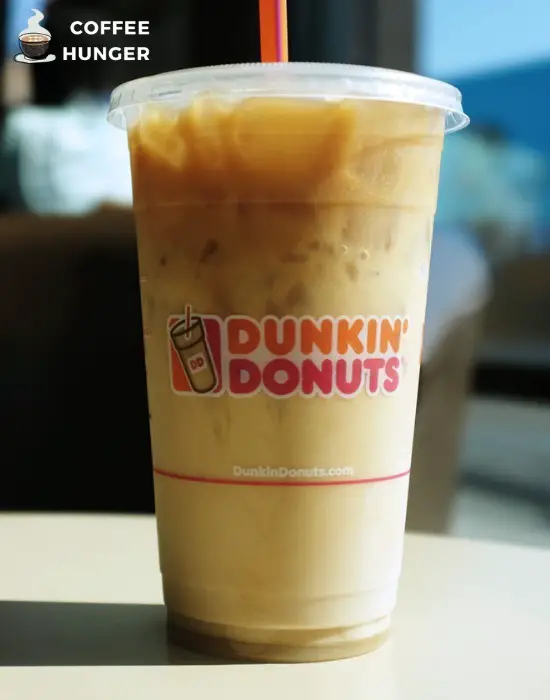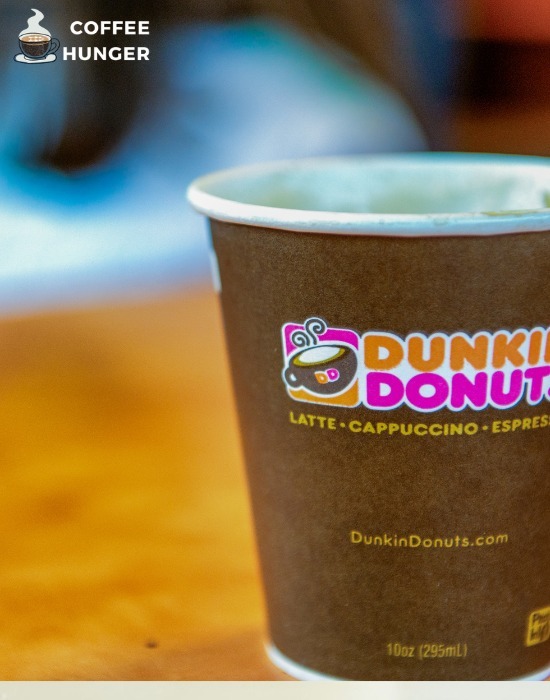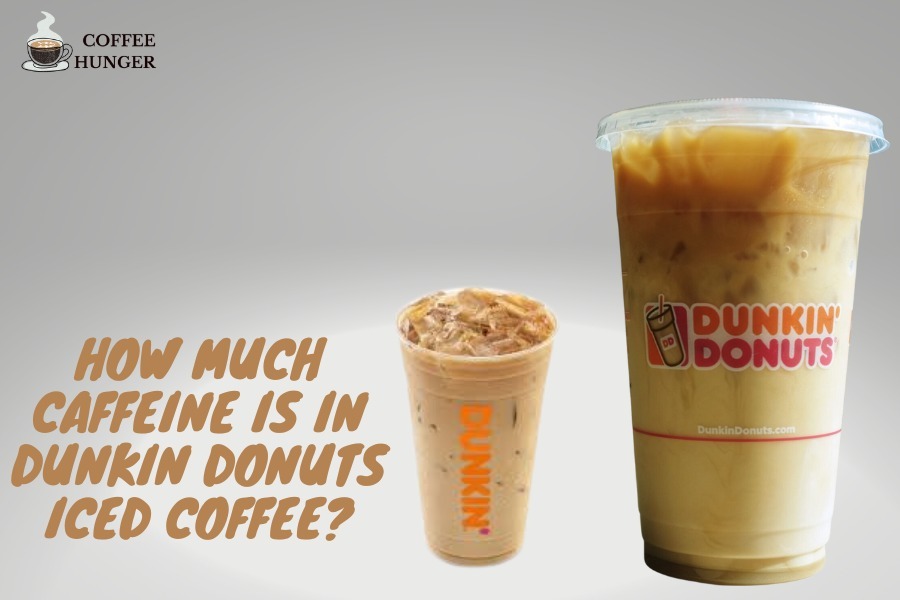I am sure you are one of the Dunkin’ Donuts iced coffee lovers and want to know How Much Caffeine is in Dunkin Donuts Iced Coffee?
In this article, we’ll take a closer look at the caffeine content of Dunkin’ Donuts iced coffee, including how it varies by size and flavor.
We’ll explore the caffeine levels in different sizes of iced coffee and factors that can influence the caffeine content. Additionally, we’ll compare Dunkin’ Donuts to other coffee chains regarding caffeine content and touch upon some nutritional information and health implications.
How much caffeine is in Dunkin Donuts’ iced coffee?
The amount of caffeine in an iced coffee from Dunkin’ Donuts might change based on the drink’s size, brewing technique, and coffee bean variety Contrarily, a large iced coffee from Dunkin’ Donuts has the most caffeine on the menu at about 470 milligrams.
A big 20 oz cup provides 357 mg of caffeine, compared to 230 mg in a small 12 oz cup. It’s vital to remember that this figure is an estimate and that actual caffeine levels may differ significantly.
How much caffeine is in medium Dunkin iced coffee?
The typical amount of caffeine in a medium-sized (24 oz) Dunkin’ Donuts iced coffee is 357 milligrams.
How much caffeine is in Dunkin iced latte?
The caffeine content in a Dunkin’ Donuts Iced Latte is 6.92 mg per fluid ounce (23.39 mg per 100 ml). A 16 fl oz cup has 118 mg of caffeine overall, whereas a 24 fl oz cup contains 166 mg.

Dunkin Donuts iced coffee nutrition information and health implications
There are a few important things to be aware of about the dietary facts and potential health effects of Dunkin’ Donuts iced coffee-
-
Calories and Macronutrients
Depending on the size and any added ingredients, such as sugar or cream, the calorie value of a Dunkin’ Donuts iced coffee might change. Without added flavors or sweeteners, a medium-sized (24 oz) iced coffee typically has about 357 calories. It’s crucial to remember that calorie counts can be greatly increased by adding cream, syrups, or sugar. Depending on the ingredients, iced coffee might increase carbohydrate consumption despite normally having little protein and fat.
-
Dunking Donuts sells flavored iced coffee drinks.
Which may have extra sugars. These additional sugars, especially if ingested in excess, can raise calorie counts and negatively affect general health. If you’re worried about sugar consumption, paying attention to sugar levels and thinking about foods without added sugar or sugar alternatives is crucial.
-
Caffeine Sensitivity
Caffeine, a naturally occurring stimulant, is an ingredient in Dunkin’ Donuts iced coffee. While most people can consume modest amounts of caffeine without experiencing any negative effects, others may be more susceptible. The adverse consequences of excessive caffeine use include jitteriness, an elevated heart rate, and trouble falling asleep. If you are sensitive to caffeine or have specific medical issues, it is important to be aware of your caffeine tolerance and consider moderation.
-
Dietetic Balance and Moderation
While Dunkin’ Donuts iced coffee may be used in moderation as part of a balanced diet, it’s vital to consider this when making other dietetic decisions. Drinking high-calorie or sugary beverages regularly without considering other parts of your diet might lead to weight gain and associated health problems. The secret to sustaining a healthy lifestyle is moderation and thoughtful decision-making.
Keep in mind that every person has different dietary demands and health issues. A licensed dietician or healthcare expert may provide individualized guidance based on your unique dietary requirements and health objectives.
Factors that impact the caffeine content of Dunkin Donuts iced coffee-
The amount of caffeine in a Dunkin’ Donuts iced coffee can vary depending on several factors.
Here are some important things to think about-
- Coffee Bean Type: The amounts of caffeine in various coffee bean varietals vary. Arabica beans, frequently used to make Dunkin’ Donuts coffee, typically have less caffeine than Robusta beans.
- Roast Level: The amount of roasting coffee beans might impact their caffeine concentration. Compared to darker roasts, lighter roasts often contain a little more caffeine.
- Brewing Technique: How the iced coffee is brewed might affect how much caffeine is extracted. Caffeine levels might vary according to the brewing process, such as drip or cold.
- Coffee-to-Water Ratio: During brewing, the proportion of coffee grounds to water can change the amount of caffeine present. Caffeine concentration typically rises as the coffee-to-water ratio increases.
- Brew Time: How long the coffee is brewed might affect how much caffeine is extracted. Caffeine levels may rise with longer brewing durations.
- Serving Size: The quantity of caffeine you take will naturally depend on the size of the iced coffee you purchase. In general, larger sizes have more caffeine than smaller ones.
Which coffee has the most caffeine, Starbucks, Dunkin Donuts, or Mcdonald’s?
Comparing Starbucks to Dunkin’ Donuts and McDonald’s, the caffeine level of Starbucks is often greater. The amounts of caffeine in some of these chains’ most popular coffee drinks are roughly compared below:
Starbucks: Starbucks provides a variety of coffee drinks, such as cold brew, espresso-based drinks, and brewed coffee. Compared to other choices, their brewed coffee often has more caffeine. For instance, a Starbucks 16 oz (Grande) brewed coffee may include 310 milligrams of caffeine.
Coffee selections from Dunkin’ Donuts include standard brewed coffee, iced coffee, and beverages made with espresso. The average amount of caffeine in a medium-sized (24 oz) Dunkin’ Donuts iced coffee is around 267 milligrams, compared to the amount in a medium-sized (14 oz) cup of brewed coffee, around 210 milligrams.
McDonald’s also offers various coffee beverages, such as brewed coffee and beverages made with espresso. McDonald’s coffee typically has a lower caffeine concentration than Starbucks and Dunkin’ Donuts. For instance, a McDonald’s normal 16 oz (Medium) brewed coffee has about 145 milligrams of caffeine.

How Much Caffeine in Dunkin Donuts Decaf Coffee?
Although most of the caffeine in Dunkin’ Donuts decaf coffee has been removed during processing, it’s crucial to remember that it still contains some caffeine. The type of coffee bean used and the brewing technique are two factors that might affect the quantity of caffeine in Dunkin’ Donuts decaf coffee.
Dunkin’ Donuts decaf coffee typically has 7 milligrams of caffeine per 12-ounce drink. It’s crucial to remember that everyone’s tolerance to caffeine differs, and some people may still be sensitive to even trace doses of the substance. It could be preferable to look into alternatives to coffee completely if you are expressly looking for a caffeine-free choice, such as herbal teas or caffeine-free drinks.
Conclusion-
For a balanced approach to intake, take the caffeine amount of Dunkin’ Donuts’ iced coffee into account. Based on your tastes and health factors, decide how much caffeine you should consume. Consider the dietary elements, such as the calorie and sugar levels. For those seeking alternatives with less caffeine, remember that Dunkin’ Donuts sells decaf products.
FAQs
1. How much caffeine is in Dunkin Donuts’ iced coffee bottle?
Depending on the particular product and serving size, the caffeine amount of a Dunkin’ Donuts bottled iced coffee might change. The typical amount of caffeine in a 13.7 oz container of Dunkin’ Donuts iced coffee is 171 milligrams. You should always verify the label or Dunkin’ Donuts’ website for the amount of caffeine in the bottled iced coffee you’re referring to.
2. How much caffeine is in dunkin donuts unsweetened coffee?
Depending on the serving size and brewing technique, the unsweetened coffee from Dunkin’ Donuts may contain more or less caffeine. Unsweetened coffee from Dunkin’ Donuts typically has 390 milligrams of caffeine per 12 fl oz drink. However, this figure may vary significantly depending on the coffee bean used and the brewing method.
3. How much caffeine is in a 12 oz Dunkin Donuts coffee?
Depending on the precise kind (such as plain brewed coffee, iced coffee, or flavored coffee), a 12 oz cup of Dunkin’ Donuts coffee typically contains roughly 130 milligrams of caffeine. It’s crucial to remember that the caffeine concentration might change depending on the brewing technique, the type of coffee bean, and how the consumer prepares it.
4. What has more caffeine at Dunkin iced coffee or cold brew?
Dunking Donuts cold brew often contains more caffeine than conventional iced coffee. Longer steeping times are used to make cold brew coffee, which extracts more caffeine. The average amount of caffeine in a medium-sized (24 oz) Dunkin’ Donuts cold brew is around 205 milligrams, whereas the average amount in a medium-sized iced coffee is about 198 milligrams. It’s important to remember that these numbers might change depending on things like brewing strength and individual customization.
5. Is iced coffee more caffeinated than hot?
In general, heated coffee has more caffeine than iced coffee. You need to use less coffee when making iced coffee since it will be diluted with ice, water, or other ingredients like milk. Cold brew has somewhat less caffeine than hot coffee, even though most kinds utilize more coffee beans. This is because using hot water to make coffee extracts more caffeine.
Also Read:
Do Dunkin refreshers have caffeine?
What Is Sunrise Batch Iced Coffee?
